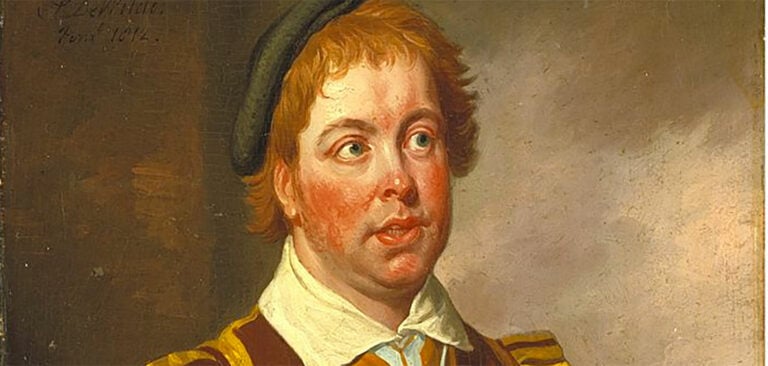
Angelo Monologue (Measure for Measure) | Act 2 Scene 4
This monologue—from a seriously underrated Shakespeare play—is one of my personal favourites, and one I often turn to in theatre auditions. It’s exciting, complex, and yet beautifully succinct. Hopefully, by the end of this article, you will love it as much as I do and have a better understanding of how to perform it.
As with all the articles in our Monologues Unpacked series, we will start by looking at the context in which this excerpt sits. Understanding the play is key to performing a monologue well. After that, we’ll look at the meaning and clarity of the piece, including Shakespearean language, which is the essential work actors must do on any piece they perform. Finally we will look at some tips on performing this monologue to help you really smash your audition. Let’s get started!
Step 1: Understanding the Play
Measure for Measure is referred to as a problem play. This means it doesn’t fit neatly into the usual categories attributed to Shakespeare’s work such as Tragedy, Comedy or History. Productions vary from the dark and dramatic to the ludicrously comic. This is an important point to keep in mind, as it can influence how you perform the monologue.
Let’s start with a basic run down of what has happened before the monologue for the sake of context…
Angelo is the stand-in Duke of Vienna. The society that is established in the play is one of rigid laws that, under the previous Duke Vincentio, have become lax. Angelo begins the play as a precise, by-the-book ruler who we understand will enforce the laws in an uncompromising way. Claudio, who the play centres around, has committed the act of fornication and is sentenced to death. Lucio, a friend of Claudio, goes to Claudio’s sister, Isabella, who lives in a convent, and entreats her to help free her brother.
Isabella meets with Angelo to beg for her brother’s life. She is persuasive and articulate in her dealings with Angelo, but he seems stubborn. However, after she leaves their first meeting (Act 2 Scene 2), we see Angelo deeply affected by his feelings towards Isabella. For the first time in his life, he feels a strong desire to be with a woman. He asks her to return the next day. In the following scene (the one the monologue is featured in) he puts forward his simple demand: sleep with me and your brother lives. Isabella is horrified and says she will tell the world what kind of man Angelo really is. This monologue is his response…
Full synopsis: Spark Notes Measure for Measure
Step 2: Understanding the Monologue
Original Text (Act 2 Scene 4)
ANGELO:
Who will believe thee, Isabel?
My unsoil’d name, the austereness of my life,
My vouch against you, and my place i’th’ state
Will so your accusation overweigh,
That you shall stifle in your own report,
And smell of calumny. I have begun,
And now I give my sensual race the rein:
Fit thy consent to my sharp appetite;
Lay by all nicety and prolixious blushes,
That banish what they sue for. Redeem thy brother
By yielding up thy body to my will;
Or else he must not only die the death,
But thy unkindness shall his death draw out
To lingering sufferance. Answer me tomorrow,
Or, by the affection that now guides me most,
I’ll prove a tyrant to him. As for you,
Say what you can: my false o’erweighs your true.
Unfamiliar Language
Whenever you encounter a new Shakespeare script, our first recommendation is always to familiarise yourself with any strange or unknown words. Don’t leave anything to doubt, and don’t make assumptions based on a guess: if you have any doubt at all, look it up! We’ve provided a few definitions below to get you started.
Austereness: Strict or severe in discipline.
Stifle: To hold back; cut off.
Calumny: The making of false and defamatory statements about someone in order to damage their reputation; slander.
Prolixious: Time-wasting, tedious, protracted.
Modern Translation
Who is going to believe you, Isabel?
My perfect reputation, my moral way of living, my respected word against yours, and my position in this city will all outweigh your accusation.
You’ll be silenced and discredited, and accused of defamation. The gate is open now, and now my desires have been set free. Feed my desire—no more of your modesty and time-wasting blushes, which charm me and then banish me for being charmed. Save your brother by sleeping with me, or he’ll be sentenced to death. And not only that, but it’ll be death by torture, drawn out by your cruelty.
Accept my offer by tomorrow, or by the passion I have now, I’ll punish him. As for you, say what you want. My lie will be taken as more true than your truth.
Step 3: Notes on Interpretation
Angelo is dealing with a lot of new feelings. He is a man who seemingly lives by an impeccable moral standard, and is all of a sudden consumed by his desire for Isabella. He finds himself in the position of power and is now faced with the eternal question of whether to use that power to get what he wants. He decides he will.
Is Angelo conflicted?
Shakespeare monologues are often difficult in that they lack a clear “want”. There can appear to be no desire underpinning the monologue. As actors, we need an objective to give our scene a sense of direction and dramatic tension. Angelo is very explicit about what he wants in this monologue: Isabella. The challenge for the actor is working out how far you push that power. How conflicted you are about that desire?
We have to remember Angelo claims, until now, that he hasn’t ever felt these feelings before. It is assumed he is being truthful here (and I think Angelo genuinely is just madly attracted to Isabel) but make your own judgement call on this. Changing his level of truthfulness can result in some interesting modifiers for the scene!
Playing for sense
Regardless of your intention as an actor, always play for clarity. This monologue is best when you are a clear intention underpinning every line. Take the time to do the work on understanding the language so that you can be free to play on the floor. Then plot the actions that will take you through the scene: these are the “how” the character gets the “what” of their objective. What tactics does Angelo use to convince Isabella? Does he threaten her? Beg her? Implore her? Reason with her?
Using logic
Even though Angelo is seemingly hypocritical for what he is doing, he still uses his same logic and stubbornness in his arguments. He is precise and clear about what he is saying. I think this is a small, but important point to be aware of. If you decide he is simply using logic and stubbornness to justify his actions, think about what he thinks he stands to lose.
Be flexible
Angelo is a contentious character. For this reason, you might find, in an audition context, a director will have a completely different impression of the character. It is especially important with this monologue to prepare it in a way that is flexible. Experiment with different actions and intentions and don’t lock in any choices too rigidly. It’s always important in theatre auditions to show your ability to take direction.
Conclusion
What a fun monologue! I hope you love this monologue as much as I do and add it to your repertoire of monologues. If you want more tips on preparing a Shakespeare monologue, check out How to Prepare a Shakespeare Monologue for an Audition.
Remember that preparation is the key to any audition. So work on it with another actor or a director and make sure you are always flexible and ready to respond to what a director asks of you. You may also be interested in exploring some more Measure for Measure Monologues.


Leave a Reply